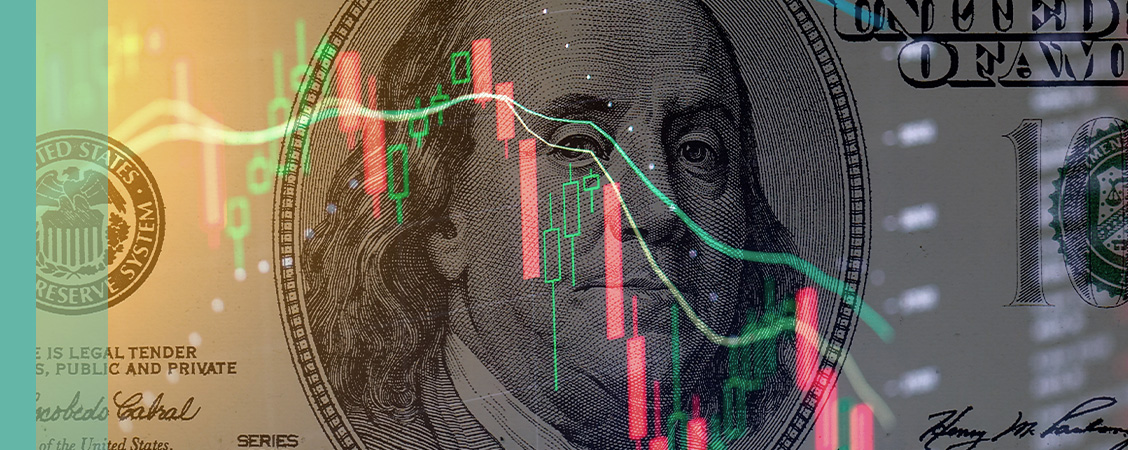
Investment views
Market Watch: The price tag of protectionism
Senior portfolio manager Charles de Kock’s quarterly Market Watch provides an overview of the implications of the Trump tariffs and the budget debacle threatening South Africa’s GNU.
The Quick Take
- Aggressive tariff policies have rattled global markets and raised the risk of a trade war
- Emerging market currencies have come under pressure, with the rand particularly hard hit amid domestic political uncertainty
- In these challenging markets, we remain vigilant – looking to add quality businesses trading at compelling valuations
Less than three months into the new Trump administration, a whirlwind of policy changes and executive orders has unsettled financial markets. Among these, the most consequential has been the swift introduction of tariffs. While the imposition of tariffs was a central promise of the Trump campaign, the scale and speed have exceeded market expectations.
Nevertheless, Trump has shown a willingness to negotiate, suggesting that the final tariff structure may still evolve from the initial April 2 announcement. What remains uncertain is the degree to which trade partners will retaliate or not.
That said, political realities make some form of retaliation likely. No political leader can afford to appear passive in the face of protectionist measures. In my view, the risk of a full-blown trade war is real. China has already hit back with a 34% hike in tariffs on US goods, alongside a raft of other measures. These include export bans on seven types of rare earth elements – potentially critical for technologies such as optical fibres, data storage and transmission – an antitrust investigation into the Chinese subsidiary of the US chemical giant DuPont, and the addition of several US tech companies to its “unreliability list”, which bars Chinese suppliers from selling components to them. A trade war is a classic “lose-lose” scenario for the global economy. Consumers ultimately bear the burden as the cost of imported goods rise and inflationary pressures could make the central banks more reluctant to cut interest rates, even in the face of slowing growth. Markets have already reacted, with the S&P 500 and other stock markets suffering sharp declines as investors digest the potential fallout from policy pivot.
The case in favour of tariffs is built on the hope that more expensive imported goods will stimulate domestic production. While theoretically possible over the long term, the reality is that transforming the US into a major manufacturing economy would require substantial capital investment and many years to materialise. In the short term the more immediate impact is clear – rising prices across a range of goods. A tariff is a tax. And the April 2 announcement amounts to a massive tax hike. While some goods are more price-sensitive than others, the net result is reduced disposable income for households.
LESSONS FROM SOUTH AFRICA’S TARIFFS HISTORY
South Africa offers a cautionary tale. Under the National Party, South Africa pursued a policy of inward industrialisation. The gist of it was to maximise local production and reduce reliance on imports. High import tariffs were central to this policy, making imported goods very expensive. The result was a surge in domestic manufacturing, with many companies establishing local production facilities and enjoying protection that allowed them to charge significantly above global market prices. However, in the early 1990s, as South Africa re-entered the global economy and signed the World Trade Organisation (WTO) Agreements and the General Agreement on Tariffs and Taxes (GATT), import tariffs were reduced and a number of those manufacturing businesses shut down unable to compete with higher-quality, lower-priced imports.
South Africa’s experience is not unique and offers important lessons. The tariffs may encourage some US firms to produce locally but if those firms are not competitive, they will remain reliant on ongoing protection.
A future US administration could reverse course and reinstate a free trade agenda, with a very predictable outcome for those firms who started their businesses behind the tariff barriers. Trump’s ambition to reinstate the US as a big manufacturing country is therefore fraught with uncertainty, as few businesses will look to commit significant capital to building capacity behind what may prove to be temporary trade barriers.
THE US FISCAL DEFICIT
In previous writings, I’ve highlighted the unsustainable debt burden in the US and other major economies. Neither US presidential candidate appeared particularly concerned about it, with both campaigns promising tax cuts and increased spending. In our global multi-asset funds, we have avoided holding sovereign debt for some time.
However, following a recent interview with Treasury Secretary Scott Bessent, it appears that the new administration does recognise the scale of the fiscal challenge and is committed to addressing it. On the spending side, the DOGE, under the leadership of Elon Musk, has the goal of cutting $1 trillion of government expenditure. It is a massively ambitious target but one should not underestimate Musk’s ability to get things done. On the revenue side, the administration hopes to generate higher income through a combination of import tariffs and the “Trump card” visa programme. Efforts to rein in government debt, combined with the prospect of slower global growth due to trade tensions, may create a more favourable backdrop for bonds relative to equities.
GEOPOLITICAL FLASHPOINTS PERSIST
Geopolitical tensions continue to cast a long shadow over markets. In Gaza, a ceasefire agreement was reached, and several hostage exchanges took place, but the truce has since broken down, reigniting tensions in the region. In Ukraine, negotiations aimed at ending, or at least de-escalating the conflict have yet to bear fruit, with the parties seemingly still far apart. Hopes for a “peace dividend” in the form of lower energy prices have yet to materialise, though ongoing negotiations offer a glimmer of hope.
THE GNU AND THE BUDGET CRISIS
Back home, the budget debacle is very serious and may mean the end of the DA’s participation in the Government of National Unity (GNU). At the time of writing, the DA’s continued participation is still uncertain, with the ANC’s National Executive Committee mandating fresh negotiations with all parties about the future of the GNU. However, voting against the budget and taking the ANC to court about the procedural issues around the budget makes it very difficult to stay on the inside. In my view, the trust between the two biggest parties has eroded significantly.
MARKET IMPLICATIONS
The announcement of tariffs has heightened the risk of a global recession. Inflation in the US is expected to rise, as exporters are unlikely to fully absorb the cost increases. Any boost to domestic manufacturing will take time – if it happens at all.
Global stock markets have traded sharply lower in anticipation of the trade war. Emerging market currencies have come under pressure with the rand particularly hard hit due to the budget debacle and heightened political uncertainty.
In this environment, we have maintained a high offshore weighting in our multi-asset funds and our South African equities exposure is tilted towards the rand hedge stocks. This positioning provides protection against a weak rand. Market sentiment towards both global and domestic financial assets is likely to stay depressed as the reaction to the Trump tariffs comes through. Our research team remains focused on bottom-up stock picking, and we continue to find many enticing opportunities. A bout of market weakness may present us with an opportunity to add quality businesses at attractive prices. We remain vigilant and ready to act when opportunities arise.
 Global (excl USA) - Institutional
Global (excl USA) - Institutional


